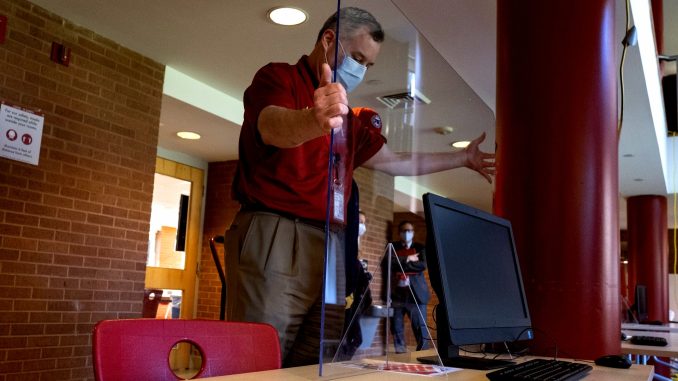
Mark Denys, senior director of Temple University Student and Employee Health Services, has helped prepare Temple University for five infectious disease outbreaks — Swine Flu, mumps, the Ebola and Zika viruses and COVID-19 — since he began managing the health departments in 2004.
Denys outlined three basic goals that he implemented throughout each of the outbreaks – keeping people informed and educated, treating anybody who is sick and protecting others from catching the virus.
During the Ebola and Zika viruses, Student Health Services led a contact tracing initiative, also a key component in keeping track of the university’s COVID-19 cases, Denys said. Student Health Services responded to the mumps and swine flu outbreaks by implementing vaccination clinics, which helped inform the vaccination clinics Temple hosted for COVID-19.
During the Swine Flu, or H1N1 flu strain, outbreak in the United States in the fall of 2009, Denys remembers driving to the Philadelphia Health Department, and putting flu vaccines in the back of his Subaru to take back to campus — a contrast to the university’s current, more sophisticated COVID-19 vaccination efforts, he said.
While none have required the extent of the planning, preparations and mitigation efforts that have been necessary during the COVID-19 pandemic, Denys and Student Health Service’s experiences navigating previous outbreaks has helped inform their response to COVID-19, Denys said.
Currently, Denys is tracking the number of COVID-19 cases in Philadelphia, the university’s cases and hospital admissions with an internal spreadsheet and frequently checking Temple’s and Philadelphia’s COVID-19 dashboards, Denys wrote in an email to The Temple News.
Denys, who worked about 50 hours in a typical pre-pandemic work week, manages Student Health Services’ daily operations by overseeing all employees, payroll, staffing, schedules, accessibility, affordability and budgets, he said.
During the 2020-21 academic year and the height of the pandemic, Denys’ responsibilities grew and he started working 70 to 80 hours per week from February 2020 to April 2021. In February 2020, he began collaborating with University Housing and Residential Life to create spaces for quarantining students, following public health guidance from city, state and federal officials, Denys said.
During this time, he was also keeping track of COVID-19 test results and sending them to the contact tracers, Denys added
“At one point, there’s really six different websites and testing sites that I was looking at,” Denys said. “Taking all those positive results and making sure they all got to the contact tracers as quickly as possible and still checking them throughout the day.”
Denys was also the chief operating officer for the surge hospital at the Liacouras Center which opened on April 16, 2020, and operated until early May 2020, and helped alleviate the pressure placed on Philadelphia health systems by transferring patients to a hospital with open beds, Denys said.
“That was a really intense six weeks building a hospital out of a basketball court in about two weeks and getting it ready to see patients safely in two weeks was pretty crazy,” Denys said.
Denys’ primary mission throughout the pandemic is ensuring that students can receive their education and that employees can work safely, Denys said.
Denys had to direct most of his focus on his pandemic-related responsibilities and has not been able to focus much on the day-to-day operations for Student Health Services since January 2020, he said. While working throughout the pandemic has been a challenge, Denys’ colleagues have assisted him in his usual responsibilities.
“He’s almost like a friend to everyone in the department too, he’s very personable,” said Shawn Cleary, assistant director of information technology for Student and Employee Health Services. “You can go into his office at any time, his doors always open when he’s not on a Zoom, and you can talk about anything from Star Wars to the Flyers,” he added.
Denys played a key role in making “robust” changes to Student Health Services, said Bill Wilkinson, the senior associate vice president for finance and administration in the Provost’s office and member of the university’s COVID-19 steering committee with Denys.
The number of visits to Student Health Services on Main Campus for non-COVID-19 related issues have increased from 26,000 to 50,000, a positive change because access has increased which allowed more students to receive help, Denys wrote.
With the experience of the 2020-21 academic year, Student and Employee Health Services were more prepared to test tens and thousands of people a week, he added.
“For the light at the end of the tunnel, I guess that would be it,” Denys said. “Fewer people being hospitalized, which ultimately will lead to fewer people dying, which ultimately will lead to us finally getting through this and getting even more back to normal.”
Fallon Roth contributed reporting.



Be the first to comment